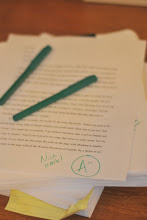I'm excited about this, but I want to approach it well. I want to know exactly WHY I think this might work. I want to know what to look for to see if it is working. And in the end, I want to be able to say with some certainty whether or not it's an approach worth repeating and exactly why. I've got a student teacher this semester and a bit more time on my hands to read, so hence my obsession with this book. I imagine I'll be using this space here to capture some of the passages and thoughts from the book that strike me as critical in my thinking about this pilot project.
So here's today's contribution (actually, I had intended to post it on Tuesday--but as F. Scott already indicated we had a crazy week here with state testing AND parent/teacher conferences). Kylene Beers wonders:
What if students sometimes worked independently and other times worked with others in their school community, local community, state community, or across the globe? What if schooling valued multiple intelligences and the curriculum were dependent on technology and multimedia? What if authentic assessments were more important than multiple-choice state tests? What if asking the probing question were valued more than providing the correct answer? What if students were required to do some sort of service project or community work and what if learning content in the textbook were not substituted for figuring out what to do with that content? What if school were the place where students found their voice, discovered how to think, and saw that what they did and believed and thought mattered? What if school were where students learned a lot (not all, but certainly a lot) about being a part of a democracy, a contributing part? What if school were a place for figuring out, where trying mattered at least as much as adequate progress, where learning proceeded at each student's level and pace instead of lock-step pace? I think if those things happened, then a high school diploma might mean something, and the something it would mean would be far different than what it meant in 1986 or 1996 or even today in 2006. (11)
So yes, what if? I love this vision of the potential the high school education. This vision might better engage more students, thus making school something real and relevant and worth their time.
We need more people wondering what if? and imagining other possible worlds for our students' lives in school.
For now, signing off--
M. Shelley


No comments:
Post a Comment